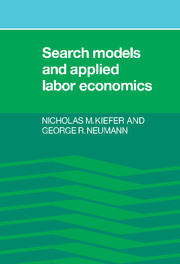Book contents
- Frontmatter
- Contents
- Preface
- 1 Introduction
- Part I Wages, reservation wages, and duration
- 2 Estimation of wage offer distributions and reservation wages
- 3 An empirical job-search model, with a test of the constant reservation-wage hypothesis
- 4 Individual effects in a nonlinear model: explicit treatment of heterogeneity in the empirical job-search model
- Part II Continuous-time models of duration
- Part III Applications
- Part IV Mobility and contracting
- Index
2 - Estimation of wage offer distributions and reservation wages
Published online by Cambridge University Press: 06 October 2009
- Frontmatter
- Contents
- Preface
- 1 Introduction
- Part I Wages, reservation wages, and duration
- 2 Estimation of wage offer distributions and reservation wages
- 3 An empirical job-search model, with a test of the constant reservation-wage hypothesis
- 4 Individual effects in a nonlinear model: explicit treatment of heterogeneity in the empirical job-search model
- Part II Continuous-time models of duration
- Part III Applications
- Part IV Mobility and contracting
- Index
Summary
Introduction
Though theoretical work on job search and the theory of reservation wages has attracted considerable attention, very little empirical work along the lines suggested by theory has been done. Empirical work in this context is potentially useful not only for better understanding of unemployment but for measuring the effects of diverse labor-market programs. For example, the provision of contingency payments such as unemployment insurance may have effects on observed market phenomena such as earnings or unemployment, but these effects are transmitted indirectly through the effect of unemployment insurance (UI) on reservation wages. To evaluate the effects of UI on market phenomena it is necessary to examine the transmission mechanism directly. Similarly, if one wishes to measure the displacement effect of a minimum wage, it is necessary to estimate the number of individuals who have reservation wages less than the minimum wage.
In this chapter we begin the econometric analysis of job search models. We specify an appropriate econometric model and discuss several issues which arise in its estimation and interpretation. We then apply the model to a sample of workers who were permanently separated from previous employment. Throughout the chapter we discuss the model in the context of a labor market, though the empirical model is more general.
The lack of empirical work along the lines suggested by theory is largely due to the identification problems which cloud the issues.
- Type
- Chapter
- Information
- Search Models and Applied Labor Economics , pp. 23 - 41Publisher: Cambridge University PressPrint publication year: 1989
- 2
- Cited by



